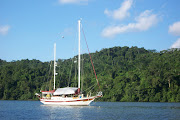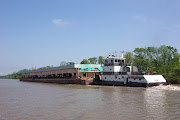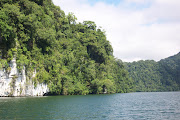No matter how many times we go to the
Bahamas, we cannot wait to return. Its pristine beauty never ceases
to amaze us. Like many cruisers, we have our favorite routes and
favorite islands. Also like many cruisers, our favorite way to truly
sample the flavors of the Bahamas is finding those perfect spots to
anchor. Anchoring in the Bahamas offers some unique challenges that
aren’t often encountered cruising inland coastal waters. Bottom
conditions can range from excellent in sand to very difficult in
scoured-out rocky channels. Some of the most problematic bottom
conditions will be heavy grass and thin layers of sand over a rock
base. Heavy grass tends to foul the anchor, and thin sand over rock
doesn’t give the anchor a chance to dig in. We have found generally
good holding in most of the anchorages we have visited on our trips
that have covered from the Abacos, to the out islands, to the extreme
southern islands. We have also encountered some of the more
problematic conditions firsthand. Anchoring close to a cut or a break
in a Cay can result in a very rolly anchorage.
Ice Cream Shops on the Chesapeake Bay
Ice Cream Shops by Boat on the Chesapeake Bay
By Susan LandryWe have been traveling up and the down the ICW for over 20 years now and have our routine ice cream shop stops pretty well set. (See Cruising World Sept. 2012 issue.) But although we are originally from the Chesapeake Bay, we had never spent months just leisurely circling the Bay and sampling all of the creamy, sweet delights it had to offer. The summer of 2013, while researching our Chesapeake Bay anchorage guide for our Great Book of Anchorage series, we decided to do research of a slightly different and more fattening kind.
Boating Safety Tips For Everyone
Always review basic safety rules with your passengers before departure.
BE WEATHER-WISE
❐ Check local weather conditions before departure
• Play it safe and get off the water if you notice darkening clouds, rough, changing winds or sudden temperature drops
FOLLOW A PRE-DEPARTURE CHECKLIST
❐ Boating safety rules
❐ Proper equipment
• Ensure you'll be ready for any on-water emergency
USE COMMON SENSE
❐ Operate at a safe speed, especially on crowded waters
❐ Be alert
❐ Steer clear of large vessels
❐ Pay attention to buoys and other navigational aids
DESIGNATE AN ASSISTANT SKIPPER
❐ Ensure another person on board can take the helm and return to shore should you become incapacitated
DEVELOP A FLOAT PLAN
❐ Always let someone on shore know your boating plans.
Include:
• Name, address, and phone number of trip leader and passengers
• Boat type and registration
• Trip itinerary
• Type of communication and signal equipment on board
LEARN TO SWIM
❐ Check with local pools, or organizations such as the YMCA and American Red Cross for lessons
WEAR LIFEJACKETS
❐ Fit and assign a lifejacket to each passenger prior to launch
TAKE A BOATING COURSE
• Boating education requirements vary by state; regardless of your state's regulations, it's smart to be educated
SCHEDULE A FREE VESSEL SAFETY CHECK
• The U.S. Coast Guard and U.S. Power Squadrons offer free vessel safety checks to verify presence and condition of safety equipment, check out your boat and make safety recommendations. Find an examiner: http://www.safetyseal.net/GetVSC/
SAFETY RESOURCES
• Boat-ed.com: Official boating safety courses and online tests for your boat license
• US Power Squadrons (usps.org) and Coast Guard Auxiliaries (cgaux.org): Free vessel safety checks, boater education and safe boating tips
• Boater101.com: Water and boating safety instruction
Content courtesy of BoatSafe.com
The Coast Guard has recently released its first boating safety App. Features of the app include: state boating information; a safety equipment checklist; free boating safety check requests; navigation rules; float plans; and calling features to report pollution or suspicious activity. When location services are enabled, users can receive the latest weather reports from the closest National Oceanic and Atmospheric Administration weather buoys as well as report the location of a hazard on the water. The app also features an Emergency Assistance button which, with locations services enabled, will call the closest Coast Guard command center. http://www.uscg.mil/mobile/
BE WEATHER-WISE
❐ Check local weather conditions before departure
• Play it safe and get off the water if you notice darkening clouds, rough, changing winds or sudden temperature drops
FOLLOW A PRE-DEPARTURE CHECKLIST
❐ Boating safety rules
❐ Proper equipment
• Ensure you'll be ready for any on-water emergency
USE COMMON SENSE
❐ Operate at a safe speed, especially on crowded waters
❐ Be alert
❐ Steer clear of large vessels
❐ Pay attention to buoys and other navigational aids
DESIGNATE AN ASSISTANT SKIPPER
❐ Ensure another person on board can take the helm and return to shore should you become incapacitated
DEVELOP A FLOAT PLAN
❐ Always let someone on shore know your boating plans.
Include:
• Name, address, and phone number of trip leader and passengers
• Boat type and registration
• Trip itinerary
• Type of communication and signal equipment on board
LEARN TO SWIM
❐ Check with local pools, or organizations such as the YMCA and American Red Cross for lessons
WEAR LIFEJACKETS
❐ Fit and assign a lifejacket to each passenger prior to launch
TAKE A BOATING COURSE
• Boating education requirements vary by state; regardless of your state's regulations, it's smart to be educated
SCHEDULE A FREE VESSEL SAFETY CHECK
• The U.S. Coast Guard and U.S. Power Squadrons offer free vessel safety checks to verify presence and condition of safety equipment, check out your boat and make safety recommendations. Find an examiner: http://www.safetyseal.net/GetVSC/
SAFETY RESOURCES
• Boat-ed.com: Official boating safety courses and online tests for your boat license
• US Power Squadrons (usps.org) and Coast Guard Auxiliaries (cgaux.org): Free vessel safety checks, boater education and safe boating tips
• Boater101.com: Water and boating safety instruction
Content courtesy of BoatSafe.com
Special Notice
The Coast Guard has recently released its first boating safety App. Features of the app include: state boating information; a safety equipment checklist; free boating safety check requests; navigation rules; float plans; and calling features to report pollution or suspicious activity. When location services are enabled, users can receive the latest weather reports from the closest National Oceanic and Atmospheric Administration weather buoys as well as report the location of a hazard on the water. The app also features an Emergency Assistance button which, with locations services enabled, will call the closest Coast Guard command center. http://www.uscg.mil/mobile/
Simple and Inexpensive Air Conditioning
Wifi On The Boat - Part 4
Our current WiFi set-up has been functioning almost full-time on two boats for about seven years. The progress of our WiFi system has been recorded in previous blog posts, Simple And Inexpensive WiFi and WiFi On The Boat-Part 3 that details the progression to our current equipment. This blog post is possible via that same set-up. We're not ones that have to have the latest and greatest, and we have one hard and fast rule, "If it ain't broke, don't fix it." But change is inevitable, and we have made a few additions to our WiFi arsenal to improve our ability to get online as needed. This is very important since we run our anchorage guide business online and everything from the publishing to shipping and receiving is done exclusively from the boat. Changes to the availability of free or open WiFi signals made these additions a necessity for us.
The Ultimate Tribulation
By Chuck Baier
Today's blog post will be more of a personal nature rather than another boat related post. I hope you'll bear with me as I get my thoughts down to let everyone know what's going on, and for my own therapeutic value. The big story is near the end if you want to skip right to it. I will bring you up to date first on where we are and how Beach House and crew finally arrived after a long and difficult struggle to make our current destination. If you have been following our recent posts, you know that we had been in Carrabelle for a couple of months trying to cross the Florida Big Bend to get over to the west coast of Florida. Beach House finally made the crossing, albeit short one of her regular crewmembers.
Today's blog post will be more of a personal nature rather than another boat related post. I hope you'll bear with me as I get my thoughts down to let everyone know what's going on, and for my own therapeutic value. The big story is near the end if you want to skip right to it. I will bring you up to date first on where we are and how Beach House and crew finally arrived after a long and difficult struggle to make our current destination. If you have been following our recent posts, you know that we had been in Carrabelle for a couple of months trying to cross the Florida Big Bend to get over to the west coast of Florida. Beach House finally made the crossing, albeit short one of her regular crewmembers.
Can I Take My Boat to Cuba?
Can we go now? That's the question every American Skipper has been asking since the President announced talks on normalization with Cuba on December 17th, and the internet is abuzz. Unfortunately, there are a lot of misconceptions and misinformation out there. That announcement stated that talks were to begin on the normalization process, and although the idea of formal talks between the two countries in itself is historic, we still have a long way to go before we top off our fuel tanks in Key West and point the bow south. So the short answer to the main question is, YES AND NO. The original announcement was only for formal talks and nothing more. In the following weeks, there were more announcements and some changes, and suddenly everyone was getting more excited and the rumors began flying throughout the boating community. There is a but. You have always been able to take your boat to Cuba, IF you apply for and are granted a license by the Treasury Department. This is still the case.
Trials and Tribulations
The mechanic at Dockside Marina in Carrabelle did an excellent job getting Beach House back in operation. After our 4-hour tow back to the marina from the Gulf of Mexico, and a quick phone call to the mechanic, Eric arrived early the next morning. We were concerned with letting the engine sit, even overnight, with water in the cylinders and oil pan. There wasn't much that could be done about it on such short notice and just getting someone on board by the next day was better than we expected. Not knowing how serious the problem was made for a fitful sleep that evening. Whenever something like this happens, you always expect the absolute worse and have expectations of major expense and delay. When you live on your boat full time and don't have a place to go ashore when these things happen, it makes the anxiety even stronger.
Subscribe to:
Comments (Atom)





.jpg)
.jpg)








